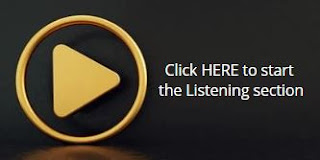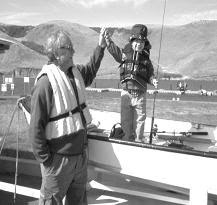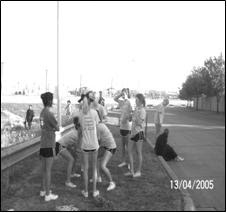Listening Section
In this section of the test, you will have the chance to show how well you understand spoken English. There are 4 parts to this section, with special directions for each part.Part I: Pictures
Questions: 1 to 3Directions:
For each item, there is a picture in your test book and four short statements about it on the tape. These statements will be spoken twice, but are NOT WRITTEN out in your test book, so you must listen carefully. You must choose one statement – (A), (B), (C), or (D) – that best describes the picture. Then, on your answer sheet, mark your choice.
Example: Look at the picture and listen to the four sentences.

- The girl is wearing a T-shirt.
- The girl has curly hair.
- The girl looks unhappy.
- The girl is holding something.
Now let’s begin with picture number 1.
Part II: Questions - response
Questions 5 to 8.Directions:
In this part of the test, you will hear several questions spoken in English, followed by three responses, also spoken in English. The question and responses will be spoken twice. They will not be printed in your test book, so you must listen carefully to understand what the speakers are saying. You have to choose the best response to each question.
Now listen to a sample question.
You will hear; “Where can I pick up my tickets?”
You will also hear:
- Thursday morning, if that’s convenient.
- At the Overseas Travel Desk.
- I think it’s at nine o’clock.
Now let’s begin with question number 5.
- Mark your answer on your answer sheet.
- Mark your answer on your answer sheet.
- Mark your answer on your answer sheet.
- Mark your answer on your answer sheet.
Part III: Short Conversations
Questions 9 to 12Directions:
In this part of the test, you will hear several short conversations. You will hear the conversations twice. The conversations will NOT be printed in your test book, so you must listen carefully to understand what the speakers are saying. In your test book, you will read a question about each conversation. The question will be followed by four answers. You have to choose the best answer to each question, and mark it on your answer sheet.
Example:
You will hear:
Man: "Are you a student here?"You will read: Where does the dialogue probably take place?
Woman: "Yes, Sir."
Man : "Where is the English class?"
Woman: "Next to the laboratory."
- At the hospital.
- At the station.
- At the market.
- In a school.
- What time is it?
- Two o’clock
- Ten minutes past two
- Three o’clock
- Three fifty
- What are they talking about?
- The opponent’s football team.
- A ball.
- A football match.
- Their team’s loss.
- What is the man ordering?
- A napkin.
- A glass of water.
- Room equipment.
- A chicken sandwich.
- What does the woman prefer to do?
- Going to the fair.
- Staying at home.
- Living in a windy town.
- Going out for dinner.
Part IV: Short Talks
Questions 13 to 15Directions:
In this part of the test, you will hear several short talks. You will hear the talks twice. They will NOT be printed in your test book, so you must listen carefully to understand what the speakers are saying. In your test book, you will read a question about each short talk. The question will be followed by four answers. You have to choose the best answer to each question, and mark it on your answer sheet.
- Who should listen to the announcement?
- Bus drivers
- Bus passengers
- Bus conductors
- Bus station workers
- Why are the closings taking place?
- It’s Sunday.
- There is no transportation.
- It’s a national holiday.
- The weather is bad.
- What does the company provide?
- Conference planning
- Furniture rentals
- Food for business occasions
- Maid service




















